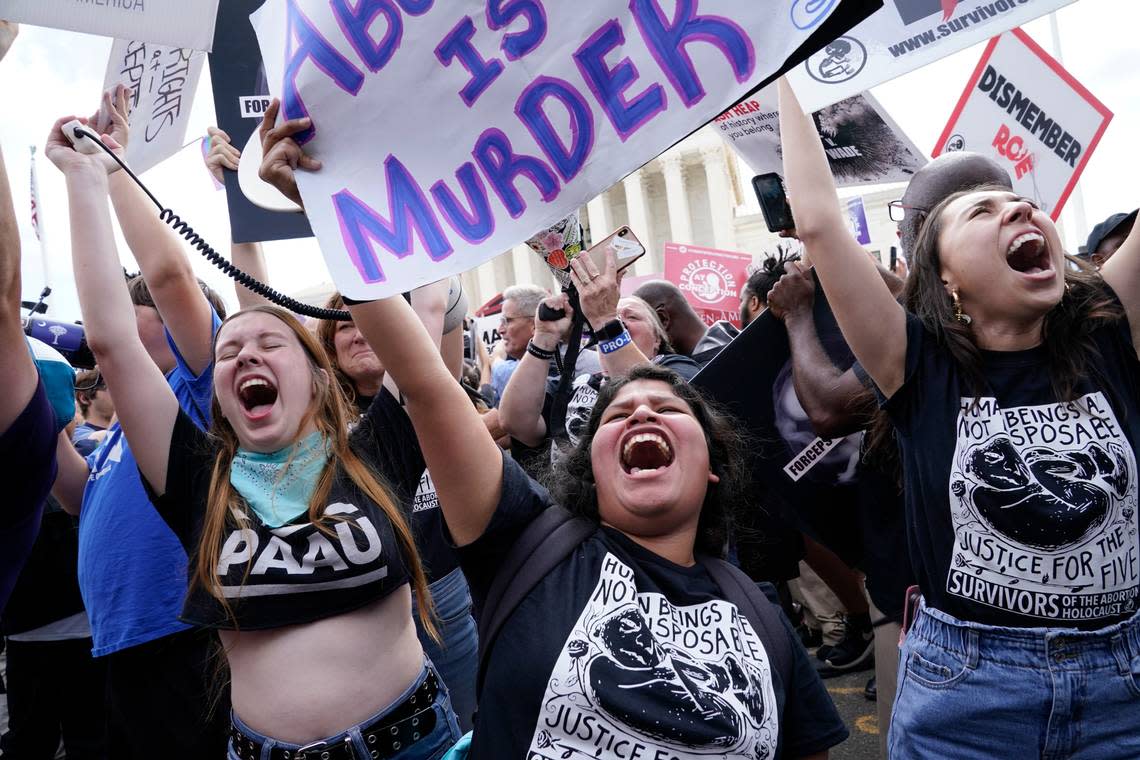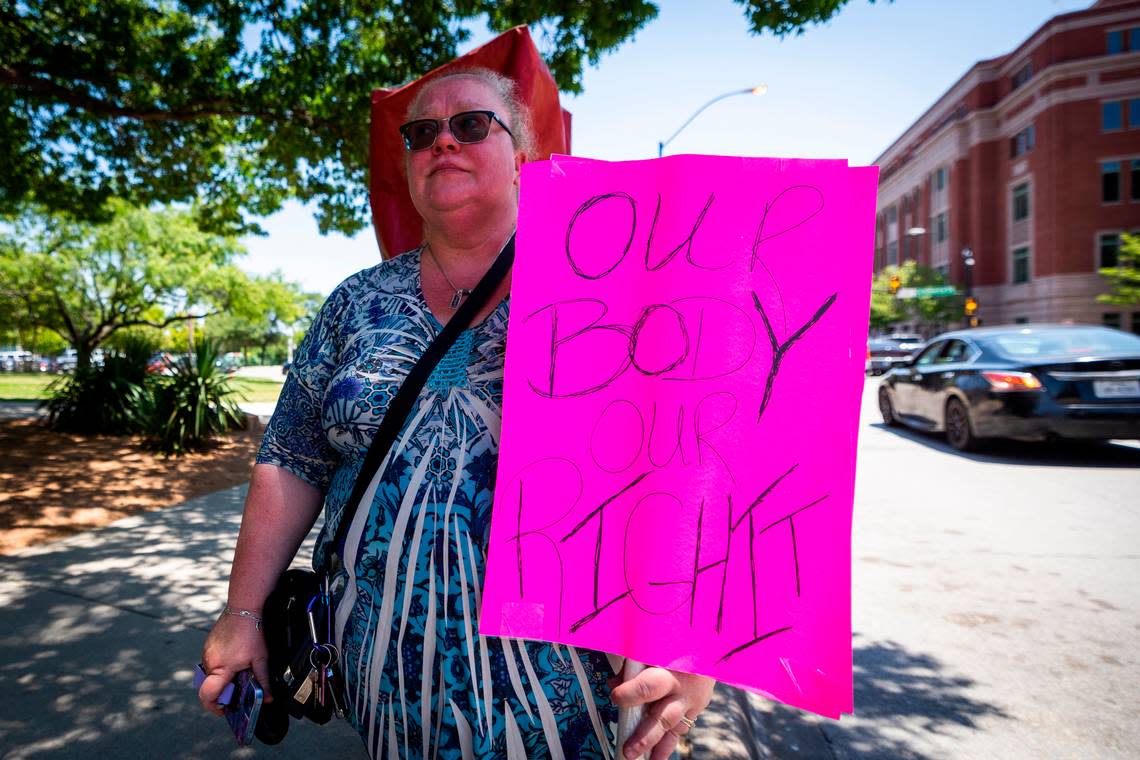After abortion, other federal rights are up for debate. What role may Texas play?
After the U.S. Supreme Court revoked federal abortion access, advocates and political strategists are preparing for renewed debate on other federal rights, including contraception and same-sex marriage.
And Texas could play a central role in new cases challenging those rights, experts say.
The Supreme Court’s June 24 decision in Dobbs v. Jackson Women’s Health Organization overturned the federal abortion access that had been granted under the 1973 Roe v. Wade case, and gave decision-making power back to the states. The ruling may have also opened the gates for other federally protected rights to be challenged.
In his concurring but solo opinion in the Dobbs case, Associate Justice Clarence Thomas specifically raised the potential for reconsidering federal rights to contraception and same-sex marriage. Political science professors told the Star-Telegram that the Dobbs ruling also has implications for other women’s rights issues and for interstate commerce regulations.
“To have a 50-year precedent overturned, it’s reasonable to be concerned that other precedents could be overturned as well,” said Joanne Connor Green, a political science professor at TCU. “How likely that is to happen, we just don’t know.”
Texas is one of a number of states that were already curtailing abortion access on the state level, even before the Dobbs decision. Under the conservative leadership of Attorney General Ken Paxton and Gov. Greg Abbott, the political climate in the Lone Star State is ripe for more boundary-pushing.
“When we think about legislation, we often think about state legislatures. But one thing that’s quite common is attorneys general making meaningful policy changes through their position,” said Kayla Canelo, a political science professor at UT Arlington. “And I would not be surprised if that’s something that happens going forward.”

‘Signaling to other actors’
When the Supreme Court issues an opinion, even a solo opinion, that document can serve multiple purposes, Canelo said.
In Thomas’ opinion, he not only laid out his logic on the Dobbs case but also opened the door to future challenges. Thomas specifically mentioned the right to contraception, established in 1965 in Griswold v. Connecticut, and same-sex marriage, from the 2015 decision in Obergefell v. Hodges.
And when justices mention specific other topics, “they’re signaling to other actors — whether that be interest groups or other political actors — to bring litigation to the court that challenges those things,” Canelo said. “And I think that’s exactly what Thomas is doing here.”
Although Thomas’ opinion put a fine point on the potential for future reconsiderations, legal experts say even without Thomas’ opinion, some reconsideration would be on the table. That’s because legal cases are not silos — they’re decided based on other precedents, and the outcome of one case impacts the outcome of future cases.
The Supreme Court cases that granted federal rights to contraception, interracial marriage, abortion and same-sex marriage all involved privacy rights arguments, rooted in the 14th Amendment’s due process clause. That clause says that states cannot infringe on citizens’ rights “without due process of law.” In these cases, the Supreme Court has ruled that Americans have the right to make their own decisions about their personal lives, including family planning and marriage.

Absent from Thomas’ list of specified cases in his Dobbs opinion was Loving v. Virginia, which was decided on the same due process basis. That 1967 decision struck down state laws that banned interracial marriage and made it a federal right. Some experts have raised concerns that Loving v. Virginia could be at risk, because that ruling shares a legal foundation with Roe v. Wade.
Amani Wells-Onyioha, a Democratic political strategist, said that American civil rights are woven like fabric. But that setup, she said, makes them “very flimsy.”
“Pulling out Roe was just, you pulled out the wrong thread in that sweater,” said Wells-Onyioha. “And now the legality of Roe that held it together, once you remove that thread, everything else that was attached to that thread is going to come undone, too.”
And while Thomas specifically mentioned contraceptive and marriage equality rights, the Dobbs decision brings into question a host of other rights and rules, too.
Thomas Marshall, a political science professor at UT Arlington, said that interstate commerce laws could be in question, as some states push legislation and enforcement efforts to prevent residents from traveling out of state to receive abortions.
Green, the TCU political scientist, said the Dobbs ruling was predicated on the idea that the only rights protected under the 14th Amendment’s due process clause are those that were understood to be rights when the amendment was adopted in 1868.
“If we use that legal standard, women at the time … they didn’t have any independent legal rights, they couldn’t sue or be sued, they couldn’t have independent credit, they couldn’t be educated in and of their own right,” Green said.
“So many of what we take today to be rights that have evolved through an evolving understanding of what it means to be an equal member of the society, could potentially be at risk if we use this new standard of what was the understanding of rights at the time.”
But the reconsideration of cases isn’t just based on the legal logic. Because court cases are lengthy and time-consuming, there has to be a political appetite to bring a topic to the court.

Luke Macias, a political strategist who represents conservative Republicans, thinks the majority of the Supreme Court doesn’t support reconsideration of other privacy-based rights. Because of this, Macias doesn’t foresee politicians pushing those topics to the court.
Macias pointed to the concurring Dobbs opinion penned by Associate Justice Brett Kavanaugh, who wrote that “Overruling Roe … does not threaten or cast doubt on” the court’s previous decisions on contraceptive, interracial marriage or same-sex marriage rights.
“I think Kavanaugh has really made it very clear that he’s not interested in going down that road,” Macias said. “So today, I don’t know if the conservative legal movement sees a ton of momentum, as much as just the victory that Dobbs brings and the legal battles that will ensue as a result on the abortion issue specifically.”
Kavanaugh’s stance in his Dobbs opinion is non-binding, meaning he’s not held to that if a future case were brought.
Attorneys general are sometimes willing to bring cases even if they don’t know that they’ll win.
“The Court majority in Dobbs seem to have kind of tried to make a distinction between abortion and other … privacy rights cases,” Marshall said. “I don’t think it would preclude a challenge. The nature of modern constitutional law is that it depends a lot on what you can get away with.”
Future Supreme Court cases
Texas’ involvement in future litigation depends largely on who wins this November’s attorney general election. But Paxton has shown throughout his time in office that he’s willing to take up controversial topics and, if reelected, he could continue that push with contraception or LGBTQ rights cases.
In the wake of the Dobbs decision, Paxton has already indicated he would be open to defending Texas’ anti-sodomy law, which made it illegal to engage in intimate same-sex relationships. The law, widely viewed as discriminatory against same-sex couples, was ruled unconstitutional in a landmark 2003 Supreme Court decision. However, the law remains on the books today, even though it isn’t enforceable.
In a TV appearance the day of the Dobbs decision, Paxton was asked about the anti-sodomy law and whether he would defend it and take the case to the Supreme Court. He responded that his job is to “defend state law” and said he’s “certainly willing and able to do that.”
David Donatti, an attorney at the ACLU of Texas, also pointed to Paxton’s willingness to challenge the limits of states’ powers on immigration regulation. Paxton successfully defended the state’s 2017 ban on sanctuary cities, even after a similar but more stringent Arizona law was struck down by the courts. Texas’ provision is still in place.
“These things are well-established by Supreme Court precedent, but the state of Texas has said, ‘We want to be the state to challenge these things and to change these things,’” Donatti said. “They are fully willing to take up that mantle and adopt these very extreme positions.”
Based on Paxton’s history, it’s possible that a reelection could mean that Texas eventually becomes directly involved in the reconsideration of cases following Dobbs.
“I think it’s very likely that Texas would be one of those states which would originate it,” Marshall said.
Marshall noted that attorneys general tend not to be involved in multiple large, high-profile cases at the same time. Because Paxton is currently involved in legal battles over the rights of transgender youth, that could impact his willingness to step into a contraception or LGBTQ rights case.
But regardless of Paxton’s moves or his involvement on the national stage, the Texas legislature in 2023 is also expected to bring state-level proposals linked to or influenced by the Dobbs decision.
State legislation
Marshall, the UTA professor, said it’s too early to say for sure what type of Dobbs-related bills the state legislature will bring in 2023. But one thing’s for sure: Texas will see state legislation linked to Dobbs.
“I don’t think there’s any doubt that there will be a number of bills in the next legislature dealing with some of these issues,” Marshall said.
Macias, the conservative political consultant, said he expects the next legislative session to push more anti-abortion laws.
“I think that the legislature is going to be taking some pretty hard looks to make sure that unborn children are protected as much as humanly possible,” he said.
For instance, he said, he can see the state legislature attempting to block Texans from going out of state to receive abortions, or to block Texans from receiving abortion pills in the mail. Macias also said the legislature may take aim at companies that offer to pay or reimburse Texan employees for abortion services. (The Texas Freedom Caucus, a group of hardline conservative legislators, on Thursday issued a statement outlining a plan to raise legislation that would target companies and individuals that pay for abortion services for Texans.)
“The Court has not gone to the full extent that it needs to go. Unborn children are still not recognized as human beings who have a right to life,” Macias said. “And so legislation like this is needed to ensure that those children are still protected.”
This concept of fetal personhood — or granting full legal rights to fetuses — is being brought up in other parts of the country. In Arizona, a court on Friday heard arguments regarding a 2021 state law that would recognize fertilized eggs, embryos and fetuses as full persons.
Macias also said he expects the Texas legislature to continue to push anti-transgender legislation, among other issues that he linked to “the LGBT agenda.”
Legislation brought does not equal legislation passed, and it’s still unclear what type of legislation might actually be passed in the 2023 session. However, the Texas Republican party’s official platform, updated in June, indicated support for stronger anti-abortion laws and indicated strong opposition to LGBTQ people, calling homosexuality “an abnormal lifestyle choice” and opposing “all efforts to validate transgender identity.”
‘I’m fearful’
Some conservatives see the Dobbs decision as a step in the right direction, a correction of a decades-old government overreach.
On the day of the ruling, conservative media figures and politicians celebrated the decision as the righting of a 50-year-old wrong. In Texas, Paxton sent his staff home early and declared June 24, the day of the ruling, an annual office holiday to “celebrate life.”
But the same decision has left civil rights advocates worrying about a larger erosion of rights for marginalized groups.
Rita Cotterly — who founded PFLAG Fort Worth, an LGBTQ advocacy and resource center, in 1992 — said she remembers a time before the due process rights had been established. Cotterly said she often feels “quite hopeless” at the thought that those once-established rights are now in danger.
“This has got to stop. It has nothing to do with — what’s the word — woke,” Cotterly said. “It has to do with meeting the needs of people.”
Cotterly, who is 85, pointed to her childhood in the 1940s and 1950s. She said she remembers when it was illegal to have contraception in Texas and when interracial couples were run out of town. Those rights were granted federally in the 1960s, and abortion rights followed several years later.
While LGBTQ rights — including same-sex marriage — were put into place much more recently, Cotterly said she feels that other rights have been chipped away over the past few decades.
“Since the 1980s we have backtracked, backtracked, backtracked,” Cotterly said. “I’m fearful for our country right now, I think that we are at a crossroads.”
Advocates say that the repeal of these federal rights will hit hardest in poorer communities and communities of color. People who already struggle to receive medical care or to pay for necessities will struggle even more to access services such as contraception and out-of-state abortion.
Disability rights advocates have similar concerns. People with disabilities already experience more barriers to medical care and, according to federal data, a significantly higher rate of sexual assault. Plus, as the news outlet Disability Scoop recently reported, some people with disabilities cannot safely carry a pregnancy at all, meaning that abortion services can become a matter of life or death.
Donatti, of the ACLU of Texas, said he also is seriously concerned about what might come after the Dobbs abortion decision.
But he added he believes the years that these rights have been in place have changed the way that people think of themselves and the way that communities organize.
“Whatever the Supreme Court says about the autonomy one has for their own body, it is very much my view that you cannot take away the freedom, the liberty, the equality that the right to abortion has granted over the past 50 years, the ways that it has meaningfully changed people’s lives,” Donatti said.
“There are certain things that cannot be undone.”
